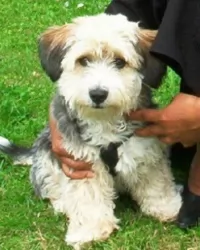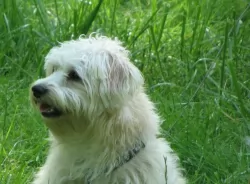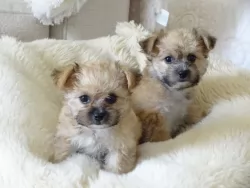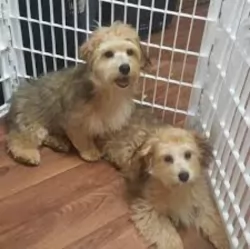 MyDogBreeds
MyDogBreeds Yo-Chon is originated from United States but Central Asian Shepherd is originated from Russia. Yo-Chon may grow 40 cm / 15 inches shorter than Central Asian Shepherd. Yo-Chon may weigh 46 kg / 101 pounds lesser than Central Asian Shepherd. Both Yo-Chon and Central Asian Shepherd has almost same life span. Yo-Chon may have less litter size than Central Asian Shepherd. Both Yo-Chon and Central Asian Shepherd requires Moderate maintenance.
Yo-Chon is originated from United States but Central Asian Shepherd is originated from Russia. Yo-Chon may grow 40 cm / 15 inches shorter than Central Asian Shepherd. Yo-Chon may weigh 46 kg / 101 pounds lesser than Central Asian Shepherd. Both Yo-Chon and Central Asian Shepherd has almost same life span. Yo-Chon may have less litter size than Central Asian Shepherd. Both Yo-Chon and Central Asian Shepherd requires Moderate maintenance.
 The Yorkie Bichon or Yo-Chon as he is fondly referred to as a designer crossbreed hailing from the United States.
The Yorkie Bichon or Yo-Chon as he is fondly referred to as a designer crossbreed hailing from the United States.
Information isn’t readily available on the origins of this cute little dog, but the dog is believed to be a cross between a Bichon Frise and Yorkshire Terrier.
It is thought that the dog was developed in the United States from about 1998 to 2001. As a hybrid, the Yorkie Bichon isn’t recognized by the American Kennel Club.
 This large dog breed is a native to the wilds of Central Asia, where it has been guarding and protecting livestock for thousands of years. In fact the Central Asian Shepherd is one of the oldest dog breeds of the world.
This large dog breed is a native to the wilds of Central Asia, where it has been guarding and protecting livestock for thousands of years. In fact the Central Asian Shepherd is one of the oldest dog breeds of the world.
Early records as to the precise origin of the breed aren’t available. There are suggestions that the breed descended from ancient Middle Eastern livestock guarding breeds, while the other suggests the dog is descended from the Tibetan Mastiff. It is almost certain that the dog was domesticated from the Wolf.
 The Yo-Chon stands between 25 and 30cm and weighs in the region of 2 to 4kg. He can be like a teddy-bear this little dog and the coat can be either silky and straight or wavy. It is medium length and some people have the coat professionally trimmed.
The Yo-Chon stands between 25 and 30cm and weighs in the region of 2 to 4kg. He can be like a teddy-bear this little dog and the coat can be either silky and straight or wavy. It is medium length and some people have the coat professionally trimmed.
The low shedding coat comes in a variety of colors – cream, grey, tan, white, black or bi-colored.
Your Yorkie Bichon will no doubt have some habits that come from both parent breeds. Your dog is likely to be independent, social, friendly, social and loving, wanting to spend lots of time with you.
They’re small but they make good watchdogs with their high-pitch bark. Your Yo-Chon is an intelligent little dog too and by having him trained and socialized he is well behaved and pleasant to have around. You can tell him to lie down, sit or stay which is useful when you have visitors.
He gets on well with children, but the puppies particularly are tiny and fragile and they can easily get hurt by untrained and undisciplined children.
 The Central Asian Shepherd is a large dog, standing at up to 70cm in height and weighing in the region of 50kg. The dog is powerfully built and muscular, with the tail being traditionally docked to a short bob. Undocked, the tail is naturally long, thick at the base and tapering down. When relaxed, the tail is carried low, but when he becomes alert and excited, the tail is up and curved.
The Central Asian Shepherd is a large dog, standing at up to 70cm in height and weighing in the region of 50kg. The dog is powerfully built and muscular, with the tail being traditionally docked to a short bob. Undocked, the tail is naturally long, thick at the base and tapering down. When relaxed, the tail is carried low, but when he becomes alert and excited, the tail is up and curved.
The ears of this dog are also traditionally cropped close to the head so that the dog almost appears to have no visible ears. This practice is also falling away and the natural ears of this breed are small and set at- or below eye level.
The brown eyes are small to medium size and are deep set. The Central Asian Shepherd Dog is double-coated with short to medium length hair and can be found in quite a few different colors such as tan, white, black, grey, brindle, ticked or a blend of these colors.
You have to be careful about where you buy your Asian Shepherd from as these dogs can be prone to aggression. With good breeding however, the dog is evenly tempered. As a first time dog owner, this shouldn’t be your first choice as it is a dominant, wilful, territorial, independent dog who will require a tough, firm, strong owner. Training and socialization are imperative to ensure he becomes obedient. He is then capable of forming close and strong bonds with his master, becoming a loyal and devoted pet. He also makes an excellent guard dog.
He is a protective dog breed, and once trained can get on well with children and other pets. He is the kind of dog that you will want to supervise around small children.
 The Yo-Chon is an independent, happy dog who loves nothing more than to be surrounded by all his favorite human beings.
The Yo-Chon is an independent, happy dog who loves nothing more than to be surrounded by all his favorite human beings.
They are loving, loyal and gentle dogs and are good playmates for children who have been taught how to handle them with care and kindness.
He is smart and has an amicable nature and will take kindly to being trained and socialized.
With the Yo-Chon in your life, you can be sure you’re going to benefit from having a splendid family pet and companion.
 It is important for those interested in the Central Asian Shepherd Dog as a pet to do some research on the breed. For instance this is a large dog that has been used for fighting.
It is important for those interested in the Central Asian Shepherd Dog as a pet to do some research on the breed. For instance this is a large dog that has been used for fighting.
While he can’t be described as being overly aggressive, you do need to be aware of his history, especially when you have small children in the home.
This dog is intelligent and confident too while also being exceptionally protective, and therefore he makes a good watchdog.
It is essential to have your Central Asian trained and socialized, and then he becomes far more relaxed and obedient, making him a loyal, loving guardian and friend.
 Both the Yorkie and Bichon Frise are dog breeds that are prone to Legg-Calvé-Perthes disease. This is when there is insufficient blood supply to the hind thigh bone, so the dog becomes lame.
Both the Yorkie and Bichon Frise are dog breeds that are prone to Legg-Calvé-Perthes disease. This is when there is insufficient blood supply to the hind thigh bone, so the dog becomes lame.
Surgical correction is necessary. Like small dogs in general, the Yochon might have dental issues. Slipped kneecaps, hypothyroidism and eye problems might affect the Yochon as well.
 The Central Asian Shepherd doesn't have any hereditary ailments and he is generally a healthy, robust breed.
The Central Asian Shepherd doesn't have any hereditary ailments and he is generally a healthy, robust breed.
Large breeds are always prone to hip- and elbow dysplasia, an abnormal development of hip and elbow, brought about by a number of factors such as genetics, the wrong diet and rapid growth with some large puppies.
A dysplastic hip or elbow doesn’t move smoothly as it should, and this results in joint inflammation and pain. Symptoms can include loss of muscle mass, pain when moving around and difficulty with standing up again once your pet lies down.
 Everybody is busy and they don’t always have time to exercise their pets. As a human being, your health relies heavily on the exercise you get so you and your dog can exercise together.
Everybody is busy and they don’t always have time to exercise their pets. As a human being, your health relies heavily on the exercise you get so you and your dog can exercise together.
These days if you seriously don’t have time and you have money to spare, there are excellent doggy daycare centers where your dog can have fun playtimes with other dogs and people.
Dog exercises will change over time with age but at least try to get used to giving your pet a walk every day as this kind of exercise can extend into old age with both you and your pet.
Swimming, ball games, fetch games and walks or hikes are all great forms of exercise.
Good nutrition ensures your Yorkie Bichon has a good chance to be healthy and energetic. Some of the commercially manufactured dog foods you get are made with bad ingredients and they can make your dog sick.
The good quality ones can be nutritious for your dog and also wonderfully convenient. Always read the packaging labels so you know what your dog’s getting.
Cooked vegetables, boiled chicken and brown rice, nicely chopped up and added to the dry kibble can add variety to your pet’s diet while remaining deliciously nutritious and tasty as well.
Brush your Yo-Chon at least twice a week to keep the hair silky and shiny. Clip your dog’s nails when they get long.
Check inside his ears for signs of redness and the possibility of an infection. Try and look inside his mouth too for bad teeth as this can cause lots of health problems for your pet.
If you don’t have the time to do all these things, there are professional pet groomers who will do all these grooming chores for you.
 Central Asians are large dogs and when he is looked after well he can reach up to 15 years of age.
Central Asians are large dogs and when he is looked after well he can reach up to 15 years of age.
It is important to see that he receives top quality, size-specific food, of which he eats a lot, and that it has all the vitamins and minerals he needs for his size.
A puppy will need high energy foods because of their energy. As he grows bigger, protein will become imperative. It is always a treat for your pet to add in some brown rice, vegetables and cooked chicken into his kibble from time to time.
Raw meat can be expensive, but if you can, it is important to ensure that your large pet gets some raw meat into his diet too, to keep his skin and coat healthy and to ward off disease. Make sure he has non-stop access to a bowl of fresh, cool water.
As previously mentioned, the coat of the Central Asian Shepherd can be fairly short but it can also be medium length. He isn't going to require any exceptional grooming but you will certainly need to give him a good brush twice a week, more so in his shedding periods. This will rid him of loose hair and keep his coat free of tangles and matting.